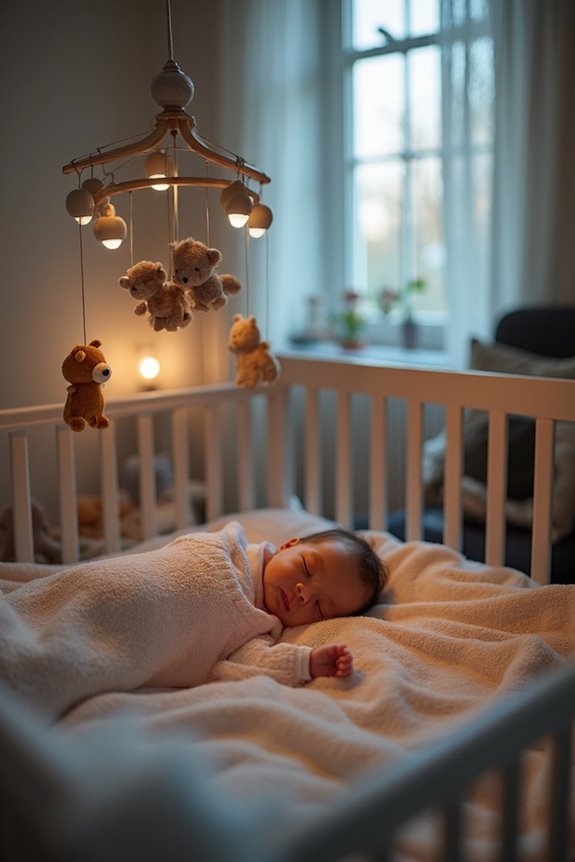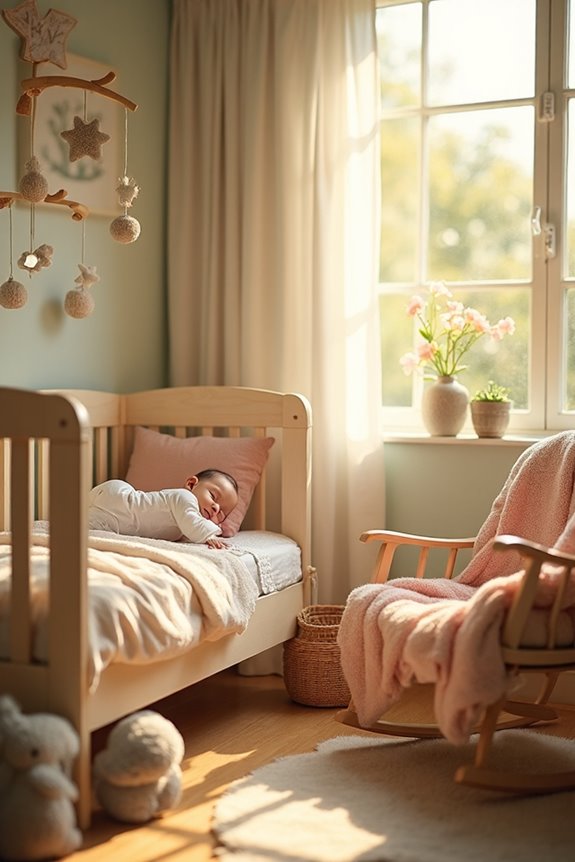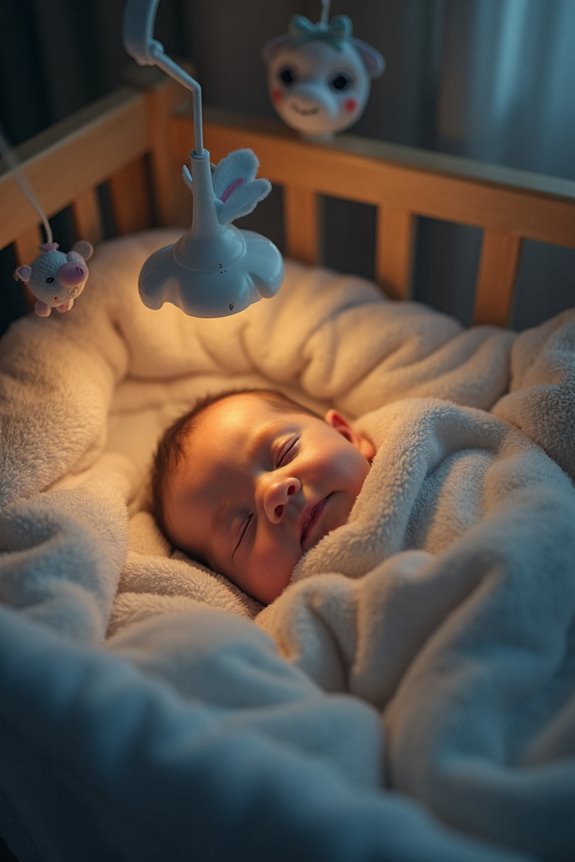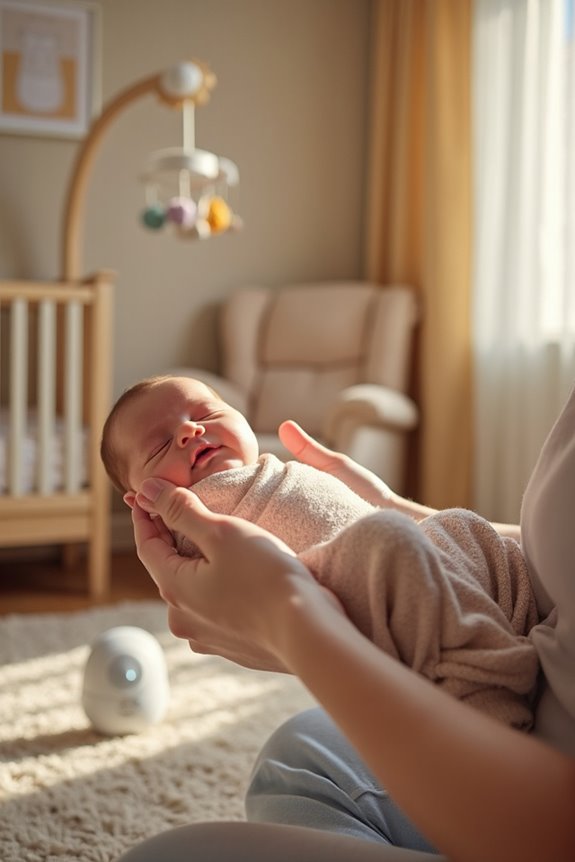Babies typically start sleeping through the night around 5 to 6 months, though it can vary. Initially, newborns sleep in short 1-2 hour bursts day and night, but by 5 months, longer nighttime stretches often emerge. Consistent routines and a calming bedtime environment support this transition. Most infants consolidate sleep into night and day patterns within the first year, with 70-80% sleeping primarily at night by 12 months. Explore more on how to foster these patterns effectively.
Key Takeaways
- Babies often begin sleeping through the night around 5-6 months of age.
- By 12 months, 70% to 80% of infants typically sleep mostly at night.
- Consistent bedtime routines can help infants sleep longer stretches.
- Nighttime sleep becomes more consistent as infants grow older.
- Sleep patterns vary among infants, and some may achieve longer nighttime sleep earlier.
Understanding Infant Sleep Patterns
When it comes to understanding infant sleep patterns, there’s a lot to unpack. Sleep cycles in newborns are quite different from ours. They sleep in short spurts of 1 to 2 hours, both day and night. By around 5 months, you might notice longer nighttime sleep stretches as sleep starts to consolidate.
Naptime duration is also essential. Initially, there might be three or more naps during the day, but as babies grow, these consolidate into two longer naps. Remember:
- Total sleep for 6-12 month-olds averages 14 hours daily.
- Environmental factors influence sleep quality.
- Consistent routines help in establishing healthy sleep patterns.
Age and Developmental Trends in Sleep
As we move from understanding the basics of infant sleep patterns, let’s explore how sleep evolves with age and development. In the first few months, our little ones experience short sleep cycles, ranging from 20 to 50 minutes. As they grow, around 3 to 4 months, these cycles mature. Babies then start experiencing deep sleep at the beginning of their cycles, a significant developmental change.
- 0-3 months: Frequent, short sleep cycles.
- 3-6 months: Longer sleep stages, less active sleep.
- 4-5 months: Possible sleep regression.
- 5+ months: Evolving sleep patterns.
Neurological and physical developments, alongside environmental factors, play a crucial role. By maintaining a consistent sleep environment, we can help foster smoother transitions through these developmental changes, aiding in longer, more restful nights.
Statistical Insights on Sleep Milestones

Understanding sleep milestones can be both fascinating and reassuring for those of us navigating the world of infant sleep. We’re often curious about when our little ones will sleep more consistently.
- Sleep Duration: In the first three months, infants usually clock between 13 and 16 hours of sleep per day. By 12 months, 70% to 80% of babies sleep mostly at night.
- Sleep Variability: Each baby is unique, with significant differences in sleep duration and patterns, even at the same age.
- Consolidation and Trends: Sleep starts consolidating into night and day patterns by 5-6 months. As infants grow, nighttime sleep becomes less variable and more consistent.
Knowing these patterns helps us set realistic expectations and recognize our baby’s progress.
Influential Factors in Infant Sleep

Let’s explore the factors that influence how infants sleep. It turns out, both genetic influences and environmental factors play crucial roles. Heritability estimates suggest that genetics contribute moderately to sleep behaviors like duration and waking episodes. Meanwhile, shared environmental effects, such as cosleeping, account for significant sleep variance. Parental practices also shape infant behaviors; consistent sleep routines can aid in developing mature circadian rhythms.
- Genetic Influences: Impact sleep patterns, showing variability among infants.
- Environmental Factors: Include bedtime routines and the sleep environment.
- Parental Practices: Influence sleep disturbances and routines.
- Infant Behaviors: Affect parent sleep, especially during infant-signaled waking.
Effective Strategies for Better Sleep
When it comes to helping babies sleep better, effective strategies can make a world of difference. Establishing a bedtime routine is key. Engaging in calming activities, like a warm bath or reading a story, signals it’s time for sleep. Consistent timing helps your little one adjust to a regular schedule. Let’s create a perfect sleep environment:
- Darkness: A dark room supports longer sleep.
- Temperature: Keep the room comfortable, around 68-72°F.
- Noise: White noise or gentle lullabies can minimize disturbances.
We should also focus on sleep associations. Gradually reducing interventions and putting your baby to bed drowsy but awake, encourages self-soothing. Remember, early bedtimes and responsive routines that adapt to your baby’s needs are beneficial. Let’s work together to ensure peaceful nights!
Clinical Perspectives and Recommendations
While navigating the sleep patterns of infants, it’s crucial to rely on clinical perspectives to better understand your baby’s sleep needs. We know that establishing good sleep hygiene involves creating a consistent sleep environment. Let’s delve into the essentials:
- Sleep Duration: Infants need between 11 to 17 hours of sleep daily, crucial for their growth.
- Day-Night Differentiation: Newborns take time to develop this understanding; patience is key.
- Sleep Environment: Placing the crib in your room can reduce SIDS risks and promote better sleep.
Consulting a pediatrician is vital when assessing sleep patterns, as every baby’s needs differ. Early intervention may prevent sleep difficulties, so let’s focus on creating a nurturing, safe space for your little one to rest and grow.
Frequently Asked Questions
How Does Sleep Affect Infant Brain Development?
We know sleep cycles are vital for cognitive development. While infants rest, their brains grow, laying foundations for future learning. Let’s cherish these moments, understanding sleep’s role in nurturing our little ones’ potential and well-being.
What Are Signs of a Sleep Disorder in Infants?
Let’s explore signs of sleep disorders together. If our baby frequently wakes, struggles with sleep apnea, or experiences night terrors, it’s concerning. We should consult a pediatrician to ensure our little one gets the rest they need.
How Does Sleep Impact Infant Growth Rates?
We’ve noticed that sleep cycles are vital for infant growth rates. Growth hormones, primarily released during these cycles, significantly boost physical development. Let’s cherish these moments, knowing each restful night propels our baby’s growth journey.
Can Infant Sleep Patterns Predict Future Sleep Habits?
Like the gentle sway of a lullaby, infant sleep patterns can whisper hints about future habits. While not crystal balls, they offer glimpses into what’s to come, shaped by parental influence and consistent routines. Let’s explore together.
What Is the Role of Genetics in Infant Sleep Patterns?
We know genetic influences play a significant role in infant sleep patterns. Sleep inheritance means our little ones might inherit sleep traits from us. It’s fascinating how these genetic factors shape their sleep habits alongside environmental influences.





